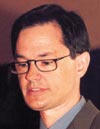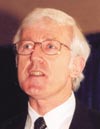International veterinary leaders speak of shared mission
The AVMA is not alone in striving to make the veterinary profession and veterinarians' lives better—at least not according to leaders from other veterinary associations around the world. Presidents of the Australian, Canadian, and World Veterinary associations, addressing the AVMA House of Delegates on July 12, discussed the common goals and challenges of organized veterinary medicine. "Our association is a very similar one, in many ways, to yours," said Dr. Robert Baker, president of the Australian Veterinary Association. "We have very similar issues and problems before us." Dr. Michael Baar, president of the Canadian VMA, said that much like the AVMA, the Canadian VMA "exists to make our members more successful."
Dr. Baar said his organization is paying close attention to the National Commission on Veterinary Economic Issues to see how the ideas behind it might also apply to Canada. "We'd all like to improve the economic base of the veterinary profession, ensuring that the delivery of veterinary care and service meets the needs of society," he said. The Canadian VMA is working on many other issues that the AVMA has tackled, including vaccination guidelines, drug approvals, and animal welfare. The World Veterinary Association also is working to achieve similar goals, according to WVA president, Dr. Jim Edwards. The WVA works on behalf of all of its member organizations, including the AVMA, on matters pertaining to veterinary medicine worldwide. Recently, the group has focused its efforts on antimicrobial resistance, animal welfare, and food safety.
"In the area of food safety, we've been working on promoting the veterinary role throughout the food chain," Dr. Edwards said. The WVA also is assessing the impact of the foot-and-mouth disease outbreak in Europe, he said. The disease devastated farms and other rural communities and businesses, and revealed the true strength of each country's safety net. "It certainly highlights the need for adequate veterinary resources and planning so that we can mitigate the effects of any outbreak," Dr. Edwards said. Despite the many concerns that the profession must address, the speakers said they were optimistic about the purpose and future of organized veterinary medicine. "What we share above all is a strong sense of pride—pride in ourselves, and pride in what we do," Dr. Baar said. "We're proud of our contributions to society. As veterinarians, we enjoy a wonderful reputation as caring, compassionate, and committed individuals, interested in the well-being of our patients and our clients." | ||||
 Dr. Robert Baker
Dr. Robert Baker

 Dr. Jim Edwards
Dr. Jim Edwards